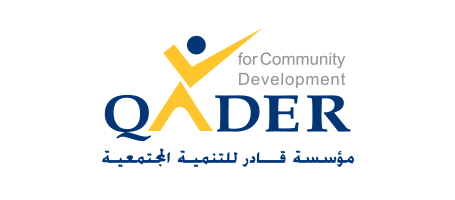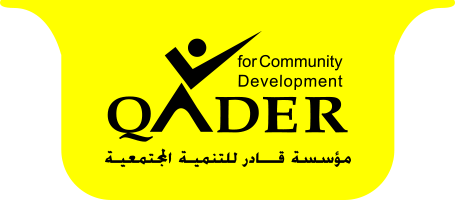QADER and the Ministry of Labor organize a dialogue session on the participation of persons with disabilities in the labor market.

QADER for Community Development, and its partner Caritas Germany, in cooperation with the Ministry of Labor and its partners, the Belgian Development Agency Enabel, organized a dialogue session on Thursday, May 29, 2025, under the title “Partnership and Empowerment – Participation of Persons with Disabilities in the Labor Market” in Ramallah.
Participants in the session included: Minister of Labor Dr. Inas Al-Atari, Head of the General Personnel Council Mr. Mousa Abu Zeid, QADER’s Director General Lana Bandak, Head of the Belgian Development Cooperation – Enabel in Palestine Christelle Joché, Head of Cooperation at the EU Office in Palestine Ibrahim Al-Afieh, Secretary General of the Palestinian General Federation of Trade Unions Shaher Saad, Chairman of the Hebron Chamber of Commerce and Industry Abdo Idris, as well as representatives from labor directorates, trade unions, chambers of commerce, municipalities, Bank of Palestine, civil society organizations, private sector entities, and employers of persons with disabilities from across the West Bank. The International Labor Organization and representatives of governmental institutions also joined the session to discuss mechanisms for the economic and social inclusion and empowerment of persons with disabilities.
In her speech, Lana Bandak, Director General of QADER for Community Development, emphasized that the inclusion of persons with disabilities in the labor market is not only a matter of justice but also an economic and social necessity. “We need real policies that encourage the private sector to change,” she said, adding that “today, through our partnership with the Ministry of Labor and Enabel, we are taking a new step on a long road, hoping it leads us to a more inclusive, just, independent, and humane Palestinian economy.”
She added: “With the deepening economic crisis, rising unemployment, and absence of effective protection systems, persons with disabilities are at the forefront of suffering — facing exclusion, discrimination, lack of reasonable accommodation, and limited opportunities. This reality demands a bold, fair, and inclusive response. Our people, including persons with disabilities, live under Israeli occupation, which not only violates individual rights but also restricts the national economy and the Palestinian Authority’s ability to control resources and invest in inclusive and effective policies.”
In her remarks, Minister of Labor Dr. Inas Al-Atari highlighted that the session sheds light on one of the noblest human rights issues — ensuring the right of persons with disabilities to a dignified life and full, equal participation in society. She noted that the active participation in the session reflects a shared commitment to building an inclusive society that embraces diversity as a source of strength.
Dr. Al-Atari affirmed that empowering persons with disabilities is not only a moral obligation but a true investment in human potential capable of innovation and contribution. She noted that the Palestinian government has sought to guarantee their rights through clear policies and legislation, including allocating no less than 5% of public employment for persons with disabilities, in addition to rehabilitation and training programs and the provision of inclusive and accessible work environments.
Christelle Joché, Head of the Belgian Development Agency – Enabel in Palestine, stressed the need to empower and protect persons with disabilities from all forms of marginalization and discrimination, and to provide them with opportunities to be productive and capable of contributing to economic development according to their capacities. She emphasized the importance of integrating them into all aspects of life, especially in the labor market under the current challenging conditions, and called for joint programs and both local and international support to create transformative change in the lives of persons with disabilities.
Ibrahim Al-Afieh, Head of Cooperation at the EU Office in Palestine, affirmed that the European Union has placed the rights of persons with disabilities — particularly the right to work — at the top of its priorities. This includes promoting policies that support their integration into society and their economic and social empowerment amidst the difficult challenges they face. He noted that there are over 123,000 persons with disabilities in Palestine following the events of October 7, stressing the need for effective steps to protect their rights and support their participation in the workforce and entrepreneurial initiatives. The EU focuses on supporting structural and policy reforms to enhance social protection and to back persons with disabilities and marginalized groups in all areas of life.
Minister Mousa Abu Zeid, Head of the General Personnel Council, also emphasized the importance of integrating persons with disabilities into the labor market, considering them a cornerstone of community development. He highlighted the importance of active partnerships with both local and international institutions to develop policies supporting persons with disabilities. He noted that the Civil Service Law affirms the right of persons with disabilities to employment by allocating at least 5% of positions according to their qualifications and abilities. He stressed the importance of enabling them through passion, innovation, and practical capacities, while preparing government institutions to accommodate various types of disabilities and provide a safe and healthy work environment.
Shaher Saad, Secretary General of the Palestinian General Federation of Trade Unions, underscored the active societal role of persons with disabilities and the importance of implementing local and international standards and agreements related to their employment in public and private sector institutions. He also pointed to the importance of amendments to the Palestinian Labor Law in support of the rights and protection of persons with disabilities in the workforce.
During the session, Bank of Palestine launched an initiative to promote inclusive employment and enhance job opportunities for persons with disabilities. The session also featured the presentation of real-life stories and experiences from the Palestinian labor market, highlighting inspiring professional journeys of persons with disabilities. A group of outstanding employees with disabilities who made significant contributions in their workplaces were honored.
This session is part of QADER’s ongoing efforts to enhance the participation of persons with disabilities in the Palestinian labor market, especially given the significant challenges facing the Palestinian people due to the occupation. QADER aims to build and strengthen strategic relationships with both the public and private sectors to provide employment opportunities for persons with disabilities, enabling their economic empowerment and ensuring a dignified life for them and their families.

